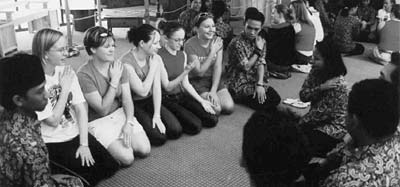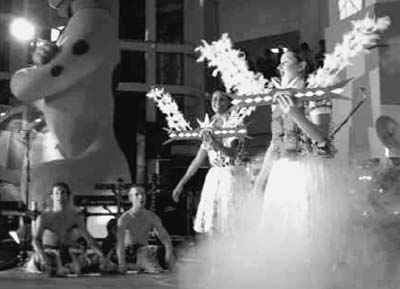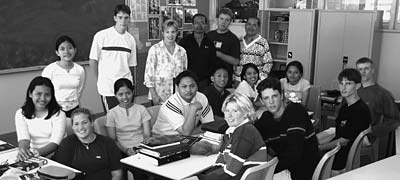Australia-Indonesia Institute Annual Report 2002-2003
The Institute aims to build groups of young and potentially influential people in both Australia and Indonesia, who have an understanding and knowledge of the two countries.
The Institute supported a range of activities focussed on young people and the development of education links. Successful student and teacher exchange programs were again a feature of the year, and new linkages were established in Lombok and South Sulawesi.
Australia–Indonesia Teacher Exchange Program
The Institute continued its support for the professional development of Australian and Indonesian primary and secondary school teachers and teacher educators through its support for the second teacher exchange organised by the Asia Education Foundation. Fourteen Australian teachers from Western Australia, Victoria, New South Wales, Tasmania, South Australia and the Australian Capital Territory participated in a 20 day Indonesian study tour in Sulawesi and Bali. The tour provided the opportunity to develop networks and professional relationships with Indonesian educators, to undertake development workshops and to gain a deeper understanding of IndonesiaÂs social and cultural environment. The second phase of the exchange involves a return visit by 11 Indonesian teacher educators and teachers which will enable them to develop their professional skills, improve their English language skills and to learn about Australian culture and society.
The Australia–Indonesia Teacher Exchange program is considered one of the flagship activities supported by the AII. It not only develops stronger linkages between Australian and Indonesian education organisations and provides opportunities for the individual participants to enhance their professional skills, it also provides strong flow-through benefits from the development of more informed curricula for the teaching of language and inter-country studies to Australian and Indonesian students.
Australia–Indonesia Youth Exchange Program (AIYEP)
The annual Australia–Indonesia Youth Exchange Program (AIYEP) involved 18 Indonesian and 18 Australian participants aged between 20 and 25 participating in two month visits to Australian and Indonesian localities respectively.
| Participants in AIYEP rehearsing an Indonesian dance routine. |
The Australian leg of the program occurs in a different State/Territory each year, and in 2001–2002 was held in Melbourne and Mildura, Victoria. The Indonesian participants were hosted by Australian families and undertook work experience placements in both locations. In Melbourne the workplace settings included government and private secondary schools, Ceres Community Environmental Park, the Australian Conservation Foundation, Amnesty International Australia, Parks Victoria, four major Melbourne hospitals, the Melbourne Times and The Big Issue. This group also gave cultural performances at Melbourne High School, the University of Melbourne and RAAF Williams base.
In Mildura, work placements included the Mildura Rural City Council, Mildura Base Hospital, Sunraysia Institute of TAFE, Coles Supermarket and a number of local schools.
In late November, the group travelled to Canberra and linked up with their Australian counterparts to complete an orientation program.
The combined group then travelled to Indonesia in December for a visit to the province of South Lampung, Sumatra, where they participated in a homestay program and a set of work experience and community development projects.
Overall, this yearÂs AIYEP program was judged a great success. Feedback received from the youth participants and others involved in the program was very positive.
Aviation Shadowing
The Institute contributed to increased international recognition for AustraliaÂs standards of training and expertise in the field of aviation and electronics, while providing teachers at the Indonesian Civil Aviation Academy (ICAA) with valuable exposure to Australian training methods, curriculum content, equipment and procedures.
Through its support for the Aerospace Industry Training Centre at Kangan Batman Institute of TAFE, the AII assisted four teaching staff from the ICAA to spend four weeks updating their knowledge and forging relationships with their Australian counterparts. The ICAA is the only civil aviation training centre in Indonesia and is responsible for training pilots, mechanics/ engineers and air traffic safety officers. It is expected that this exchange will contribute to improved standards of training for civil aviation trainees in Indonesia as well as improved procedures for safety and quality control.
Shared Case Study Teaching in Australia and Indonesia
The InstituteÂs support for a project to increase understanding of cropping systems in south Lombok and in southern Australia brought together agriculture students from the University of Mataram and La Trobe University. Two of the main objectives of the project were to enable final year agricultural science students from Indonesia and Australia to work together to address agricultural problems in both countries and to develop social and academic contact, while exposing staff from the University of Mataram to case study teaching and learning.
| Students from La Trobe University and University of Mataram on location in Lombok. |
Australian social geography textbook
Following the excellent feedback received for the first edition of the Australian social geography textbook Geografi Australia initiated and published by the Institute, an updated second edition was produced in 2002. Following the distribution of the first edition to 1000 schools in South Sumatra, Central and East Java, use of the book has been incorporated into the Indonesian primary school curriculum in those areas. The 20,000 books the Institute funded for the second edition will be distributed to schools in other provinces.
Herb Feith Scholarships
Foreign Minister Downer announced on 27 November 2001 that the Institute had established a scholarship in honour of Professor Herb Feith, one of AustraliaÂs greatest Indonesia scholars who died on 15 November 2001. The Herb Feith Scholarship will enable Indonesian students to join the new Masters Program in Peace and Conflict Resolution at Gadjah Mada University. Herb Feith was the first volunteer in a program he helped found that developed into Australia Volunteers International. The Institute has committed to this project for three students over the next four years.
NAISDA Cross-Cultural Exchange
| NAISDA students performing in Jakarta |
The Institute assisted the National Aboriginal Islander Skills Development Association (NAISDA) to send a group of students to Indonesia in June 2002 for a series of classes in dance and choreography with students at a leading studio. In addition, there was a program of performances developed mainly to allow people in the outer lying areas of Jakarta to view the performances.
As well as providing a rich cultural experience for NAISDA students, many of whom had never before left Australia, and the establishment of new relationships, the visit by NAISDA assisted the expansion of understanding in Indonesia of AustraliaÂs indigenous population and its rich and ancient cultural traditions.
Rochester/Makassar Student Exchanges
With the assistance of a grant from the Institute, a group of 15 students, 2 teachers and the Principal from SMUN–1 Makassar, South Sulawesi visited Rochester Secondary College, their sister school in country Victoria, in March 2002. During their stay in Australia they were hosted by local students, welcomed by the Mayor of the Campaspe Shire, presented with Australian AmbassadorÂs Packs by the Federal Member of Parliament, and visited places of interest in both Melbourne and the local area.
Rochester Secondary College established its Sister School Exchange Program with SMUN–1 Makassar, South Sulawesi in 2000, with the aim of increasing the cultural awareness and language proficiency of students through the opportunity to live with an Indonesian family for several weeks and/or host an Indonesian student during their visits to Australia.
The positive outcomes from this program are already evidenced in the increased number of students studying Indonesian, students increasing fluency in the language and the desire of many students to be involved in the 2003–2004 Exchange Program.
| Joint class at Rochester Secondary College with visiting Indonesian teachers and their students. |




